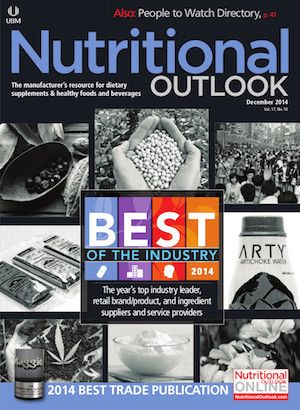Nutritional Outlook's Best of 2014: Global ID Group
A pioneer in the world of non-GMO testing, certification, and education-at home and abroad.
From Kenneth Ross’s perspective,the 2014 Institute of Food Technologists’ Annual Meeting & Food Expo was something of a turning point in the saga surrounding genetic modification, or GM, technology. After all, IFT is the major gathering of food-industry players-who, as a rule, tend to be fairly sanguine about GM. That being the case, a keen interest in non-GM offerings had “been pretty invisible” in years past, says Ross, CEO of the Global ID Group (Fairfield, IA).
Not so this go-round. “I was really taken by surprise by how much visibility the non-GMO issue had” at the June show, he recalls. “There were booths all over with people advertising non-GMO ingredients, and sessions on research about public perceptions. So if people still wonder whether non-GMO is going mainstream within the food industry, I’d say the answer is, ‘Yes.’”
That shift came in part thanks to the work of the Global ID Group. After all, to the extent that the food industry-to say nothing of consumers-can give credence to what “non-GMO” actually means, they have the actions of the Non-GMO Project and the Global ID Group and its family of companies to thank.
Since the group’s founding in 1996, it’s pursued a mission of “supporting the production of safe, ethical, and sustainable food,” as Ross puts it, by applying scientific rigor to the way we define, identify, and analyze the GM content of ingredients, agricultural goods, and finished products. At the beginning, that meant helping to pioneer the field of GMO testing as the first lab in North America-and among the first in the world-to use polymerase chain reaction, or PCR, technology to recognize and distinguish between GMO and non-GMO DNA. “Without the advent of PCR testing for GMOs,” Ross notes, “entire regulatory regimes that were put into place around the world would not have been possible.”
The Group also realized early on that consumers, regulators, and advocates would come to place high store in such information and expanded its services beyond testing to encompass third-party certification, introducing a workable non-GMO certification standard in 2000 under its CERT ID subsidiary.
That standard helped to streamline GMO verification-and, to hear Ross tell it, not a moment too soon. “We found that if you were shipping large volumes of GMO crops and had to test every lot, you’d go broke,” he explains. Their solution looked instead at the entire system-from field to factory; seed to storage-to address critical points where GMO contamination might occur. Having done that upfront, subsequent sampling on a statistical basis could provide as much assurance that a system and its outputs are certifiably non-GMO as could testing every shipment.
The process, Ross says, “is still the gold standard globally between sellers and buyers of non-GMO crops.” What’s more, it was incorporated into the ProTerra Standard that the Group debuted in 2006 to certify food and feed along dimensions ranging from environmental and social accountability to labor issues, worker safety, and more. On an annual basis, Ross says, the company certifies roughly four million metric tons of Brazilian soy destined for EU markets as both non-GMO and socially and environmentally responsible.
But even as certification programs were setting the pace for the industry, there were concerns that the USDA’s National Organic Program (NOP) included a loophole that permitted adventitious or accidental GMO contamination of organic crops, without any defined threshold of tolerance.
Since 2002 when the NOP went into effect, the GMO proportion of the domestic soybean crop has grown from 4% to over 90%-with similar growth rates for corn-leading the Group and others to conclude “that industry needed an extra level of assurance so we didn’t wake up one day and find that we couldn’t get sources of non-GMO ingredients for organic products,” Ross says. “While, at the time, organic was the best way to avoid GMOs, organic and the Non-GMO Project seal combined would assure non-GM choices well into the future.”
Thus arose what might be the Global ID Group’s crowning achievement: a founding role in the Non-GMO Project, an independent, nonprofit initiative to design and administer a product-verification program to maintain organic’s status as the gold standard for non-GMO.
Realizing that “this was a much bigger issue than any one company could address,” Ross says, Global ID contributed its CERT ID certification standard to serve as the basis for the Non-GMO Project’s. Beyond that, he gives “tremendous credit to people who, in the early stages, jumped onboard and supported that effort,” including Whole Foods, United Natural Foods Inc., Nature’s Path, Eden Foods, Lundberg Family Farms, Strauss Creamery, and others.
The Non-GMO Project standard has evolved through a five-year, multi-stakeholder process into a “rigorous and meaningful” standard that applies to seeds, feed, multiple ingredients, and finished products, and that serves the needs of growers, suppliers, manufacturers, retailers, and “everyone’s needs in the industry,” says Ross.
And now, it’s going global. While its founders designed the Non-GMO Project for domestic consumption, so to speak, “non-GMO verification is a global issue,” Ross insists, and making sense of the world’s patchwork of regimes became the Global ID Group’s next challenge.
Its solution: the Non-GMO Global Framework, whose purpose, Ross says, “is to allow a company that’s looking at its non-GMO strategy globally to understand all the global regulatory asymmetry that’s out there and source, produce, sell, and provide products in a global non-GMO marketplace.” The framework also vets labs for ISO 17025 accreditation, walks customers through global testing requirements, and helps them evaluate results. The Framework debuted at this year’s Natural Products Expo West show and, says Ross, is already helping “match up international buyers and sellers.”
To help administer its non-GMO programs and their tens of thousands of suppliers and products, Global ID developed its SupplyTrak supply-chain compliance software, which allows users to map wherever in the supply chain their products’ constituent ingredients reside. Ross notes that a development new in 2015 will permit users to track the global supply chain not just against non-GMO standards but along dimensions of concern like gluten content, child labor, resource conservation, and more.
Other new developments this year include the company’s validation and implementation of digital PCR as a GMO-detection tool-a first in the industry, Ross says. The technology is 10 times more accurate and sensitive than traditional PCR, he says, “which will allow us to do some things that hadn’t been possible before in terms of verifying and validating non-GM products.” The company is also working with Europe’s Danube Soya Initiative to ensure that a certain portion of the non-GMO soy used in Europe comes from along the Danube River, shrinking the commodity’s carbon footprint.
But of 2014’s accomplishments, the “biggest of them all” was hitting 20,000 verified products, Ross says. “In the early days, we’d go to Natural Products Expo East or Expo West, and if we saw 10 booths with a Non-GMO Project seal, we were beaming.” How that’s changed. “Clearly, we’ve gone beyond critical mass, and the industry has accepted and adopted the Non-GMO Project as the standard.”
In the coming year, the Group will publish its Global Guide to GMO Standards and Regulatory Policy, the first comprehensive online database and publication tracking in real time the progress of the Framework in all key markets, comparing regulatory regimes, retail policies, and third-party seals. “It just gives you the entire global picture along the lines of the knowledge embodied in the Framework,” Ross says.
As non-GMO’s robust presence at IFT attests, it’s a mission whose time has come, and one whose target constituency includes what Ross calls “the new food industry.” He describes this new industry as going beyond maximizing the palatability, popularity, and profitability of its products to embracing a commitment to transparency, authenticity, sustainability, social responsibility, and safety.
That’s uncharted territory for the food biz. While it’s achievable, “that doesn’t mean it’s going to be easy,” Ross says. “But I think that in this world and this new food industry, we do have to take responsibility. A lot of companies have been doing a lot of fantastic work in that area for a long time, and now it’s becoming almost a requirement going forward.”
<<Previous Next>>
More non-GMO coverage:
Understanding Global GMO Regulations

HHS announces restructuring plans to consolidate divisions and downsize workforce
Published: March 27th 2025 | Updated: March 27th 2025According to the announcement, the restructuring will save taxpayers $1.8 billion per year by reducing the workforce by 10,000 full-time employees and consolidating the department’s 28 divisions into 15 new divisions.
















